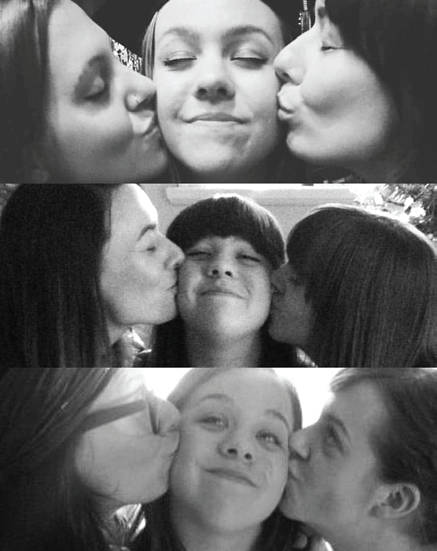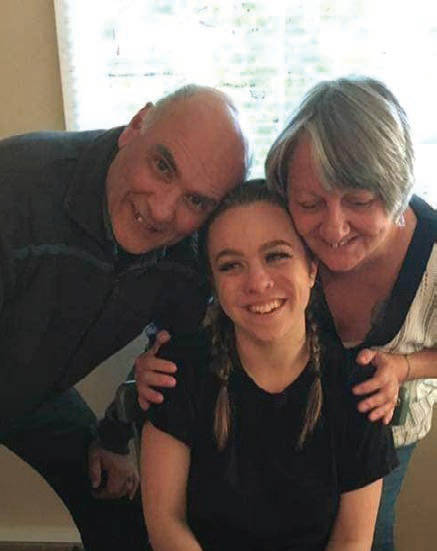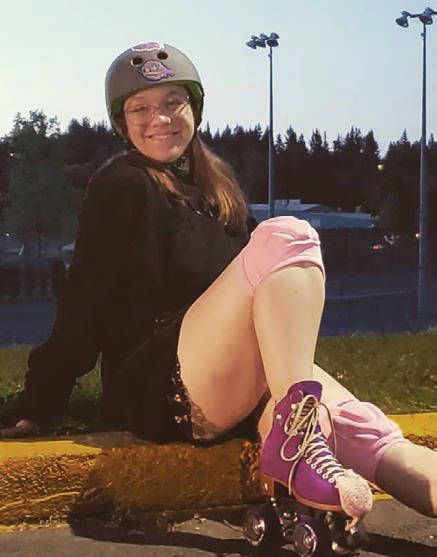



FINDING MY TRIBE
AN INTERVIEW WITH CHARLOTTE
Charlotte has learned a lot in her mere twenty-two years. She’s learned what it means to grow up with NF and how to pick yourself up when the cards just aren’t in your favour. Executive Director Desirée had the chance to connect with Charlotte via video call to learn about her experience with NF.
Charlotte was diagnosed with NF1 at just two years old. Visiting two pediatric hospitals for nearly 17 years, NF was just one part of her childhood. “I’ve known all my life that I’ve had NF”, Charlotte remarks. A struggle felt by many in our local NF community, Charlotte had no single physician to follow her on her journey with NF.
“There wasn’t anywhere to get my check-ups regularly (like MRI scans, bloodwork, neurology appointments).” Charlotte still has ongoing challenges with her NF. Most pointedly, tumours. Fortunately, though, Charlotte shared that her main concern is just “a really tiny [tumour] in between the nerves where the eyes and nose connect”. Yet in spite of her minimal tumour growth, Charlotte still has fears about her health.
“I notice more tumours on my face. It’s just kind of scary because what if one of them gets very big?” But Charlotte’s supportive community allows her to stay rooted in the present. She credits her family for teaching her positivity. At the mention of her two older sisters, I had to ask if they ever picked on her. Charlotte said thankfully she was saved from customary sibling teasing, but that she did face bullying in school.
When Charlotte moved to kindergarten, she realized she was different from everyone else. “Young children notice when people are different. Even though I’ve known all my life that I’ve had NF, they saw me and thought ‘she’s different’,” Charlotte stated. “I always ask myself why some of them bullied me. Kids will be kids, as crappy as it is. I don’t hold it against them.” But as she transitioned to middle school and then high school, her friendships became “10 times better”.
“It takes time and some effort, but when you find yourself and the group of friends who will stick with you for hopefully a long time, it’s worth it.” Charlotte doesn’t shy away from explaining her diagnosis to the people in her life. “I explain the café au lait spots and that I get benign tumours. I also explain that NF affects everyone differently.” And like most individuals with NF, Charlotte has also had to school a doctor or two.
Looking back on one experience with a physician, she notes how sometimes doctors forget how overwhelming NF is to patients.
“The doctor or nurse talking to my parents and I casually mentioned ‘Oh, Charlotte has a tumour’ and explained what that meant to my parents instead of me. Tumours are usually scary, so I had all these negative ideas come to mind. The person eventually backpedaled and explained that the tumour was very small and likely not harmful. But it was still a crappy interaction.”
Yet Charlotte has learned from this experience. When asked what she would to say to someone who isn’t getting along with his or her physician, she recommends “looking into other doctors. At the end of the day, there’s always going to be someone willing to help you get better.”
Charlotte’s perseverance and positivity has allowed her to pursue her dream of helping other people. Currently at school in Campbell River to become a support worker, her learning disabilities have never held her back. While it was a challenging transition to online learning, Charlotte was once again able to reframe her situation by choosing a “glass half-full” perspective.
“It’s harder to do homework by myself now that our classes are on Zoom. It’s also harder without any social interaction, but it has been a good challenge. So far so good!”
After completing her education program in March, Charlotte hopes to work with Campbell River Care in Counseling to support at risk youth and youth with disabilities. After that, Charlotte dreams of an adventure. “I’d really love to move to Victoria,” she admits. “Or maybe go travelling across Canada or Australia on my time off – I would love that.” When asked about the future of NF, she hopes that young adults become aware of the support available to them. “I feel that not many people outside of the NF community know about NF. The Tumour Foundation needs to keep reminding people that they aren’t alone and that it’s okay to have NF.”
Since attending school and living with a genetic disorder (all amidst a pandemic), Charlotte knows the importance of self-care. When she
I THINK IF I DIDN’T HAVE NF I WOULDN’T BE SO UNDERSTANDING AND CARING. I THINK I WOULD BE A MUCH DIFFERENT PERSON. IT’D BE NICE TO GET RID OF THE TUMOURS, BUT THE COMMUNITY THAT COMES WITH NF IS REALLY GREAT.
faces tough days, Charlotte likes to talk to loved ones, eat some ice cream, or get outside to enjoy her new favourite hobby – roller skating. “I just got some really nice skates recently,” she says with glee. “I’ve been trying to go out every day it doesn’t rain.”
Charlotte’s optimism shines brightly as we discuss a variety of topics. Unsurprisingly, when asked if she would ever get rid of her NF, Charlotte says she wouldn’t jump at the offer. “I think if I didn’t have NF I wouldn’t be so understanding and caring. I think I would be a much different person. It’d be nice to get rid of the tumours, but the community that comes with NF is really great.”
Charlotte has learned some invaluable lessons through her journey with her genetic disorder, including “that it can be challenging at times but that’s why your family and friends are there for you – to help you grow as a person”.
Charlottes wants the NF community to know that just like everything else in life, managing NF just takes trial and error. “Just know that it gets better. Even when you feel alone, know that you aren’t. Reach out to your loved ones or the Tumour Foundation online. It takes effort but it’s totally worth it in the end.”
Interviewed by Desirée Sher
